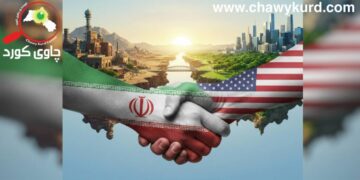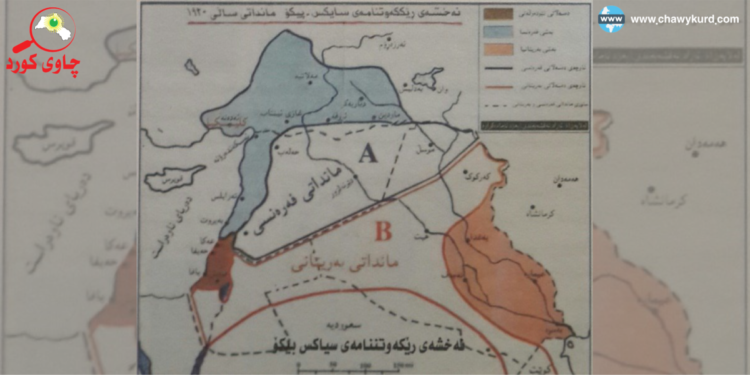After more than a hundred years
After the outbreak of World War I (1914-1918) and the ranking in the balance of world powers at that time, which came between the Allies and the Oaths? From the first year of the war, the prospects of victory of the Allied front “Britain, France and Russia” appeared, which required an important secret agreement, which after the war and the defeat of their rivals, they signed a secret treaty not to cause conflict among them and not to create another war.
The Sykes-Picot Agreement as a researcher writes: “Can a political agreement like Sykes-Picot play a major role in alienating a nation itself? It was not just a short-term eventful history that only regulated relations between two or more countries for a certain period of time, but a political history that focused on issues deeper than history, instead of focusing on the characters and the chain of events, he was able to go into a wide range of research on the social mechanisms of power and the relationship between the state and society achieved through various channels: – Attention to politics as a social and cultural form, an anthropological approach to political institutions and clarity about their role ideology in the formation of the political sphere, Sykes-Picot worked very carefully on the different ways of alienating the Kurds themselves. It is not an exaggeration to say that Kurdish history in tis hundred years old of this agreement is the history of alienating the Kurds themselves.
In conclusion, we can say that Sykes-Picot was a turning point in the history of the Kurdish and its effects still remain, however:-
- The national destiny of the Kurdish, its cause and its territory faced division and fragmentation.
- Legally, the Kurdish national destiny was tied to several states created away from the will of its communities, which became a long-term problem.
- The aspirations and goals of the Kurdish national liberation movement from independence and state formation like all other nations in the region, to the right to culture, language, culture, autonomy, etc., which none of these rights have not been peacefully guaranteed by the states into which Kurdistan was divided.
- It distorted the economic, social and cultural life of the Kurds and made them face destruction and extermination.
- Political and military violence has brought great destruction to the region, except for a short period of time, and continues until this stage.
- We believe that unless the texts of these treaties and agreements, such as Sykes-Picot, are abolished, it will be very difficult for long-term peace and stability in the Middle East including the solution of the Kurdish issue and the creation of an entity for this nation.
- We believe that unless the texts of these treaties and agreements, such as Sykes-Picot, are abolished, it will be very difficult for long-term peace and stability in the Middle East including the solution of the Kurdish issue and the creation of an entity for this nation.
“Text of the Sykes-Picot Agreement”
- That France and Great Britain are prepared to recognize and protect an independent Arab State or a Confederation of Arab States in the areas (A) and (B) marked on the annexed map, under the suzerainty of an Arab chief. That in area (A) France, and in area (B) Great Britain, shall have priority of right of enterprise and local loans. That in area (A) France, and in area (B) Great Britain, shall alone supply advisers or foreign functionaries at the request of the Arab State or Confederation of Arab States.
- That in the blue area France, and in the red area Great Britain, shall be allowed to establish such direct or indirect administration or control as they desire and as they may think fit to arrange with the Arab State or Confederation of Arab States.
- That in the brown area there shall be established an international administration, the form of which is to be decided upon after consultation with Russia, and subsequently in consultation with the other Allies, and the representatives of the Shereef of Mecca.
- That Great Britain be accorded (1) the ports of Haifa and Acre, (2) guarantee of a given supply of water from the Tigris and Euphrates in area (A) for area (B). His Majesty’s Government, on their part, undertake that they will at no time enter into negotiations for the cession of Cyprus to any third Power without the previous consent of the French Government.
- That Alexandretta shall be a free port as regards the trade of the British Empire, and that there shall be no discrimination in port charges or facilities as regards British shipping and British goods; that there shall be freedom of transit for British goods through Alexandretta and by railway through the blue area, whether those goods are intended for or originate in the red area, or (B) area, or area (A); and there shall be no discrimination, direct or indirect against British goods on any railway or against British goods or ships at any port serving the areas mentioned. That Haifa shall be a free port as regards the trade of France, her dominions and protectorates, and there shall be no discrimination in port charges or facilities as regards French shipping and French goods. There shall be freedom of transit for French goods through Haifa and by the British railway through the brown area, whether those goods are intended for or originate in the blue area, area (A), or area (B), and there shall be no discrimination, direct or indirect, against French goods on any railway, or against French goods or ships at any port serving the areas mentioned.
- That in area (A) the Baghdad Railway shall not be extended southwards beyond Mosul, and in area (B) northwards beyond Samarra, until a railway connecting Baghdad with Aleppo via the Euphrates Valley has been completed, and then only with the concurrence of the two Governments.
- That Great Britain has the right to build, administer, and be sole owner of a railway connecting Haifa with area (B), and shall have a perpetual right to transport troops along such a line at all times. It is to be understood by both Governments that this railway is to facilitate the connexion of Baghdad with Haifa by rail, and it is further understood that, if the engineering difficulties and expense entailed by keeping this connecting line in the brown area only make the project unfeasible, that the French Government shall be prepared to consider that the line in question may also traverse the polygon Banias-Keis Marib-Salkhab Tell Otsda-Mesmie before reaching area (B).
- For a period of twenty years the existing Turkish customs tariff shall remain in force throughout the whole of the blue and red areas, as well as in areas (A) and (B), and no increase in the rates of duty or conversion from ad valorem to specific rates shall be made except by agreement between the two Powers. There shall be no interior customs barriers between any of the above-mentioned areas. The customs duties leviable on goods destined for the interior shall be collected at the port of entry and handed over to the administration of the area of destination.
- It shall be agreed that the French Government will at no time enter into any negotiations for the cession of their rights and will not cede such rights in the blue area to any third Power, except the Arab State or Confederation of Arab States without the previous agreement of His Majesty’s Government, who, on their part, will give a similar undertaking to the French Government regarding the red area.
- The British and French Governments, as the protectors of the Arab State, shall agree that they will not themselves acquire and will not consent to a third Power acquiring territorial possessions in the Arabian peninsula, nor consent to a third Power installing a naval base either on the east coast, or on the islands, of the Red Sea. This, however, shall not prevent such adjustment of the Aden frontier as may be necessary in consequence of recent Turkish aggression.
- The negotiations with the Arabs as to the boundaries of the Arab State or Confederation of Arab States shall be continued through the same channel as heretofore on behalf of the two Powers.
- It is agreed that measures to control the importation of arms into the Arab territories will be considered by the two Governments.































































